 At the end of the 20th century, domestic economic and social development, along with advancements in higher education, marked the beginning of a new historical stage.
At the end of the 20th century, domestic economic and social development, along with advancements in higher education, marked the beginning of a new historical stage.
To address the needs of both domestic and international contexts, the China Central Radio and TV University (CCRTVU) launched the "CCRTVU Talent Cultivation Mode Reform and Open Education Pilot" project. The CCRTVU was responsible for the centralised management of student registrations and the issuance of graduation certificates. This pilot initiative in open education has significantly contributed to the expansion of higher education in China. It has fostered the co-construction and sharing of high-quality educational resources, established a foundational framework for an open talent training model with Chinese characteristics, and created a new mechanism for ensuring the quality of talent training in distance and open education.
In 1999, the Modern Distance Education Project was implemented.
On 13 January 1999, the State Council approved the Ministry of Education's proposal to create an Action Plan for Educational Revitalisation for the 21st Century. This plan explicitly states the need to "implement the modern distance education project, form the open education network, and build the lifelong learning system."
In 1999, the "CCRTVU Talent Cultivation Mode Reform and Open Education Pilot" project was implemented.
In April 1999, the Ministry of Education decided to implement the "CCRTVU Talent Cultivation Mode Reform and Open Education Pilot" project.

The CCRTVU signed the cooperation agreement on open education with the provincial radio and television universities (RTVUs).
In 1999, Xi Jinping visited Fujian RTVU during its 20th anniversary celebrations and sent a letter of congratulations.
On 1 October 1999, Xi Jinping visited Fujian RTVU during its 20th anniversary celebrations and sent a letter of congratulations. He expressed hope for Fujian RTVU to accelerate the modernisation of its school operations and teaching, to fully implement the modern distance education project, and to make new contributions toward realising Fujian’s grand developmental goals for the new century.

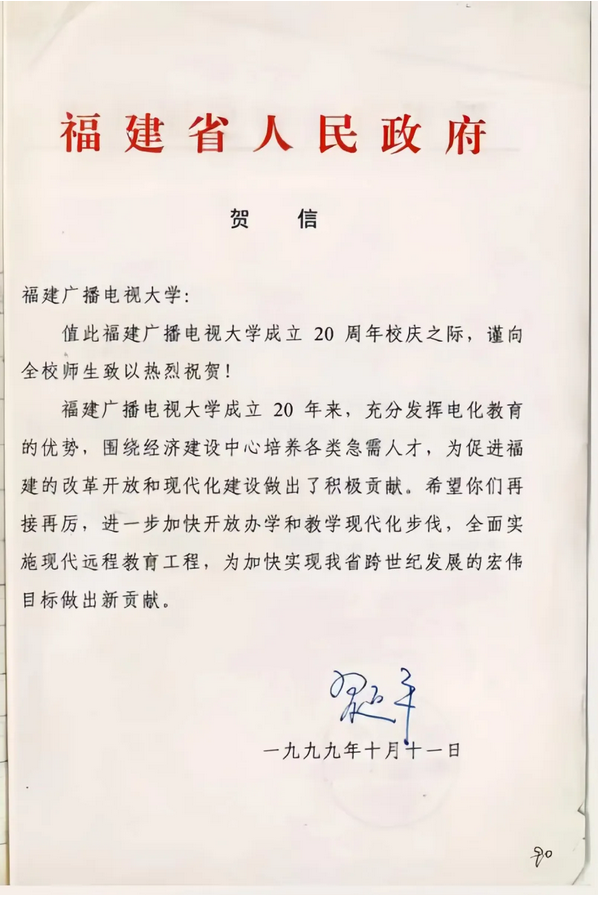
Xi Jinping visited Fujian RTVU during its 20th anniversary celebrations and sent a letter of congratulations.
In 2000, the open education website was launched.
In 2000, the open education website (www.open.edu.cn) was officially launched. This website is dedicated to students of RTVUs and aims to provide timely teaching and support services for them.
In 2000, the China’s modern distance education satellite broadband multimedia transmission platform was officially launched.
On 31 October 2000, China's modern distance education satellite broadband multimedia transmission platform was officially launched. The CCRTVU course signal broadcast on China Education Television (CETV) shifted from analog TV to digital compression mode, resulting in stronger signal reception and clearer images. Meanwhile, the platform also disseminated the CCRTVU teaching resources through the VBI and IP data broadcast system.
In 2000, distance education for military non-commissioned officers was launched.
Since 2000, the OUC has established the Bayi School (founded in 2000), Zongcan School (founded in 2001), and the School for the Air Force (founded in 2009), each tailored to specific military characteristics. These institutions, organised in collaboration with military universities and colleges, utilise modern distance learning technologies and multimedia teaching methods to provide open degree education to military non-commissioned officers across the army. This initiative delivers high-quality educational resources to the frontiers and sentry posts of China. Xu Qiliang, Deng Changyou, Chen Xi, and Ge Daokai officially inaugurated the School for the Air Force.
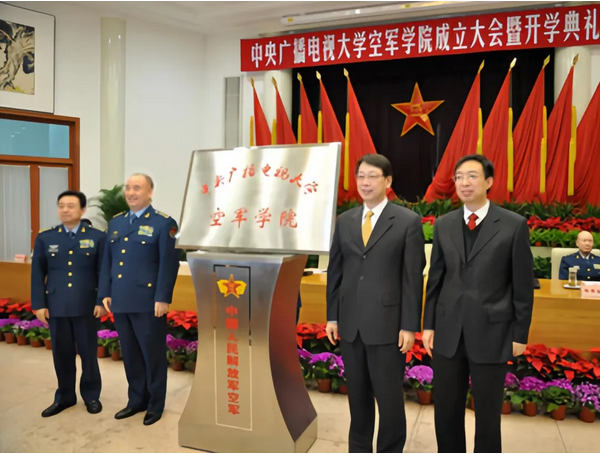
Inauguration Ceremony of the School for the Air Force
In 2001, the online discussion room was launched.
On 15 June 2001, the CCRTVU online discussion room was launched, breaking down the barriers of time and space between teachers and students. This marked a new era in using the Internet for distance and open education.

The CCRTVU Online Discussion Room
In 2002, distance education for the disabled was launched.
In 2002, the CCRTVU partnered with the China Disabled Persons' Federation to establish the School for the Disabled. This initiative aims to provide both degree and non- degree education programmes including job-specific training, practical technology training, and rehabilitation training through open and distance education. The School for the Disabled is supported by local RTVUs and local federations for the disabled, and is designed for individuals with disabilities who have the ability to learn.
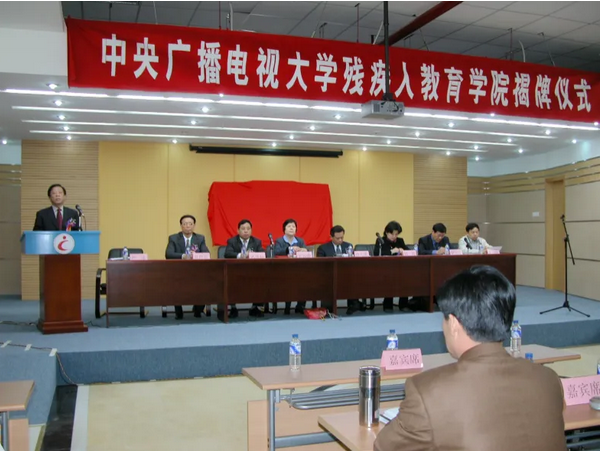
Inauguration Ceremony of the School for the Disabled, CCRTVU
In 2002, the School of Xizang of the CCRTVU was established.
In 2002, the School of Xizang of the CCRTVU was established. Utilising the teaching resources and faculty of Tibet University, the school provides distance education across the Tibet region. This initiative offers greater access to higher and lifelong education for many learners in Tibet.
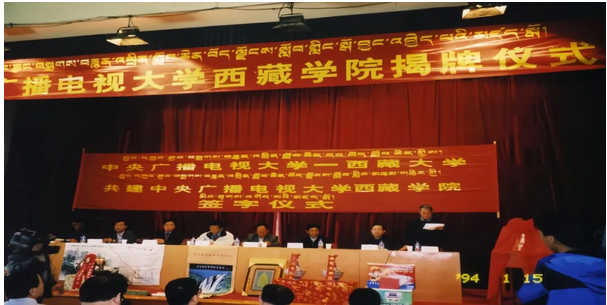
School of Xizang, CCRTVU
In 2002, the learning centre was established at the Dongbei University of Finance & Economics.
On 11 October 2002, the learning centre was established at Dongbei University of Finance & Economics. It is the only learning centre established in a regular university.
In 2004, the “One College Student Per Village” programme was launched.
Since 2004, China's Ministry of Education has launched the "One College Student Per Village" programme. Organised and implemented by the OUC through its nationwide operational system, the programme aims to send high-quality higher education resources to rural areas. It focuses on training technical and management personnel who can be "retained and useful" in the vast rural regions.
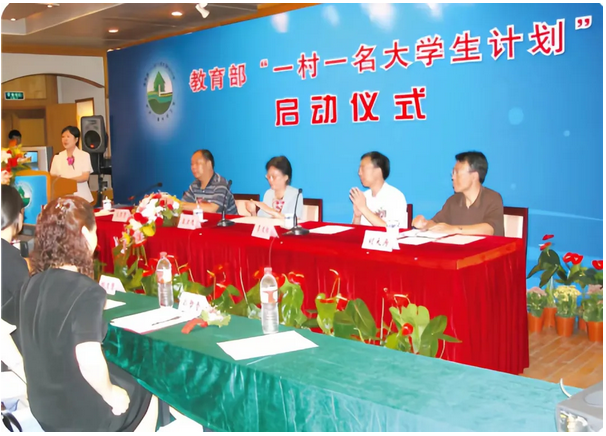
Launching Ceremony of Ministry of Education’s “One College Student Per Village” Programme
In 2004, the CCRTVU was elected as Chair unit of the AAOU.
In 2004, the CCRTVU was elected as the Chair unit of the Asian Association of Open Universities (AAOU). Since then, representing China's distance and open education, the CCRTVU has become an integral member of international cooperation and exchanges in distance education.
In 2007, the distance exam system was developed.
In 2007, the CCRTVU developed a distance exam system to organise nationwide unified online education exams.
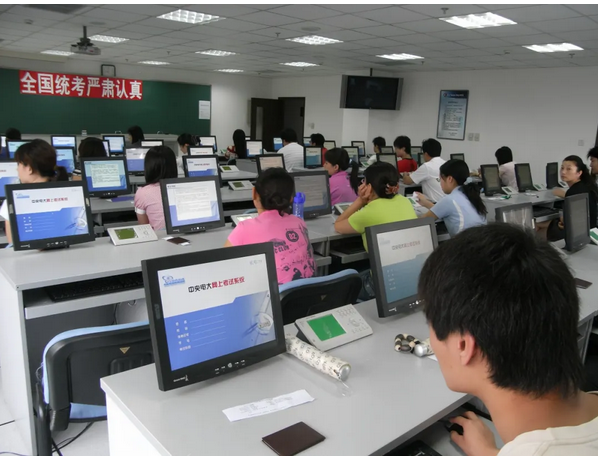
The CCRTVU was organising the nationwide unified online education exams.
In 2007, the “CCRTVU Talent Cultivation Mode Reform and Open Education Pilot” project passed the summative evaluation.
On 7 December 2007, the "CCRTVU Talent Cultivation Mode Reform and Open Education Pilot" project passed its summative evaluation. According to the evaluation, viewed from the perspective of "constructing a lifelong education system and building a learning society," the CCRTVU "has developed a basic framework for the open education talent cultivation mode, as well as corresponding teaching, management, and operational mechanisms after eight years of exploration and practice. This lays a foundation for the development of RTVUs and accumulates experience for the advancement of national modern distance education. The open education has become a significant means of promoting the development of distance education and continuing education. By the end of 2006, the pilot project had established 31 junior college programmes and 18 undergraduate majors that begin at the junior college level, with a total enrolment exceeding 3.8 million, nearly 2.17 million current students, and 1.63 million graduates.

Summative Evaluation Report Conference on the "CCRTVU Talent Cultivation Mode Reform and Open Education Pilot" Project
In 2008, Chen Zhili attended the symposium on commemorating the 30th anniversary of Comrade Deng Xiaoping’s approval for the establishment of the RTVUs.
On 31January 2008, Chen Zhili, then state councillor, attended the symposium on commemorating the 30th anniversary of Comrade Deng Xiaoping's approval for the establishment of the RTVUs and promoting the national lifelong education system construction. The event was organised by the Ministry of Education. At the symposium, she noted that over the past 30 years, the RTVUs have become the backbone of China's modern distance education, an important support for China's promotion of learning for all and lifelong learning, and an integral part of China's higher education system.
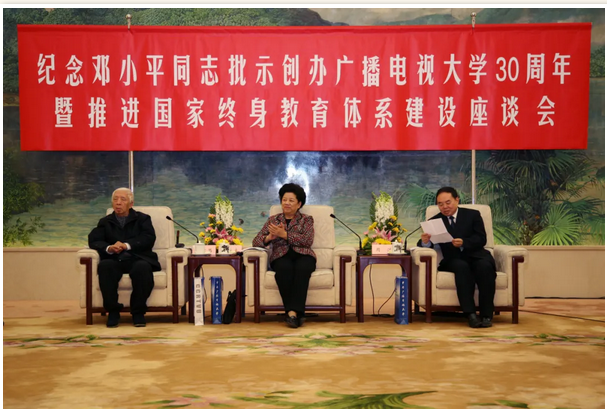
Chen Zhili attended the symposium commemorating the 30th anniversary of Comrade Deng Xiaoping's approval for the establishment of the RTVUs.
In 2008, Wen Jiabao received the RTVU student representatives.
In 2008, Wen Jiabao received the RTVU student representative Dong Ming who served as the volunteer at Beijing Paralympic Games.
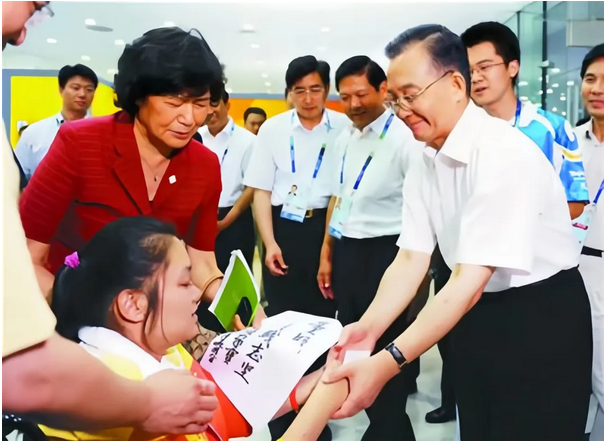
Wen Jiabao received the RTVU student representatives.
In 2008, Hu Jintao offered encouragement to Shenyang RTVU graduates.
In December 2008, Hu Jintao made an inspection visit to Liaoning Province, where he offered encouragement to the graduates of Shenyang RTVU.
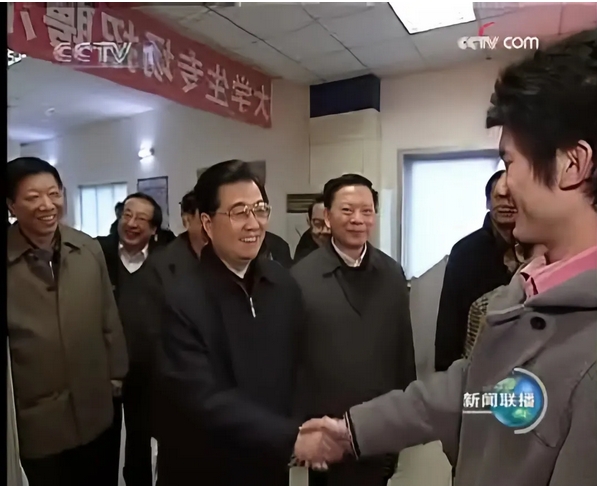
Hu Jintao offered encouragement to Shenyang RTVU graduates.
In 2008, Liu Yandong made an inspection visit to the CCRTVU.
On 31 December 2008, Liu Yandong, then state councillor, emphasised during her inspection visit to the CCRTVU that modern distance education is a burgeoning field. She encouraged those working at the forefront of RTVU education to continue their diligent efforts, actively explore new ideas, and innovate constantly. By doing so, they would play a more significant role and make greater contributions to the development of a learning society and the enhancement of the nation's overall quality.
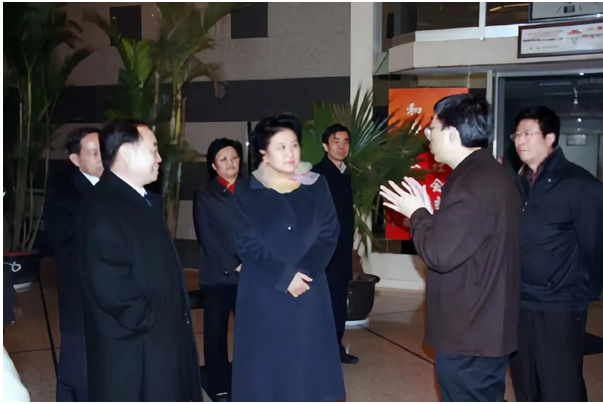
Liu Yandong made an inspection visit to the CCRTVU.